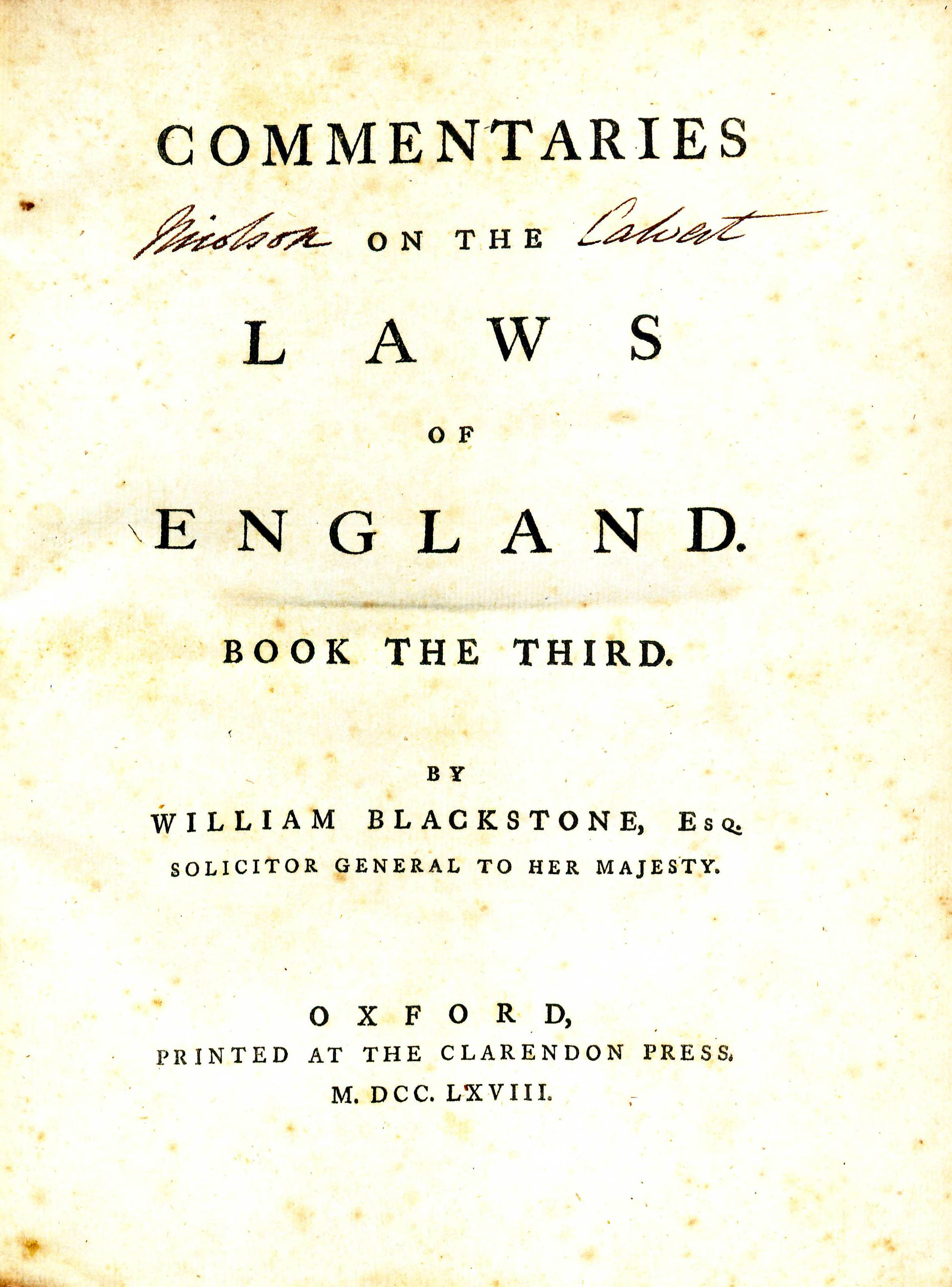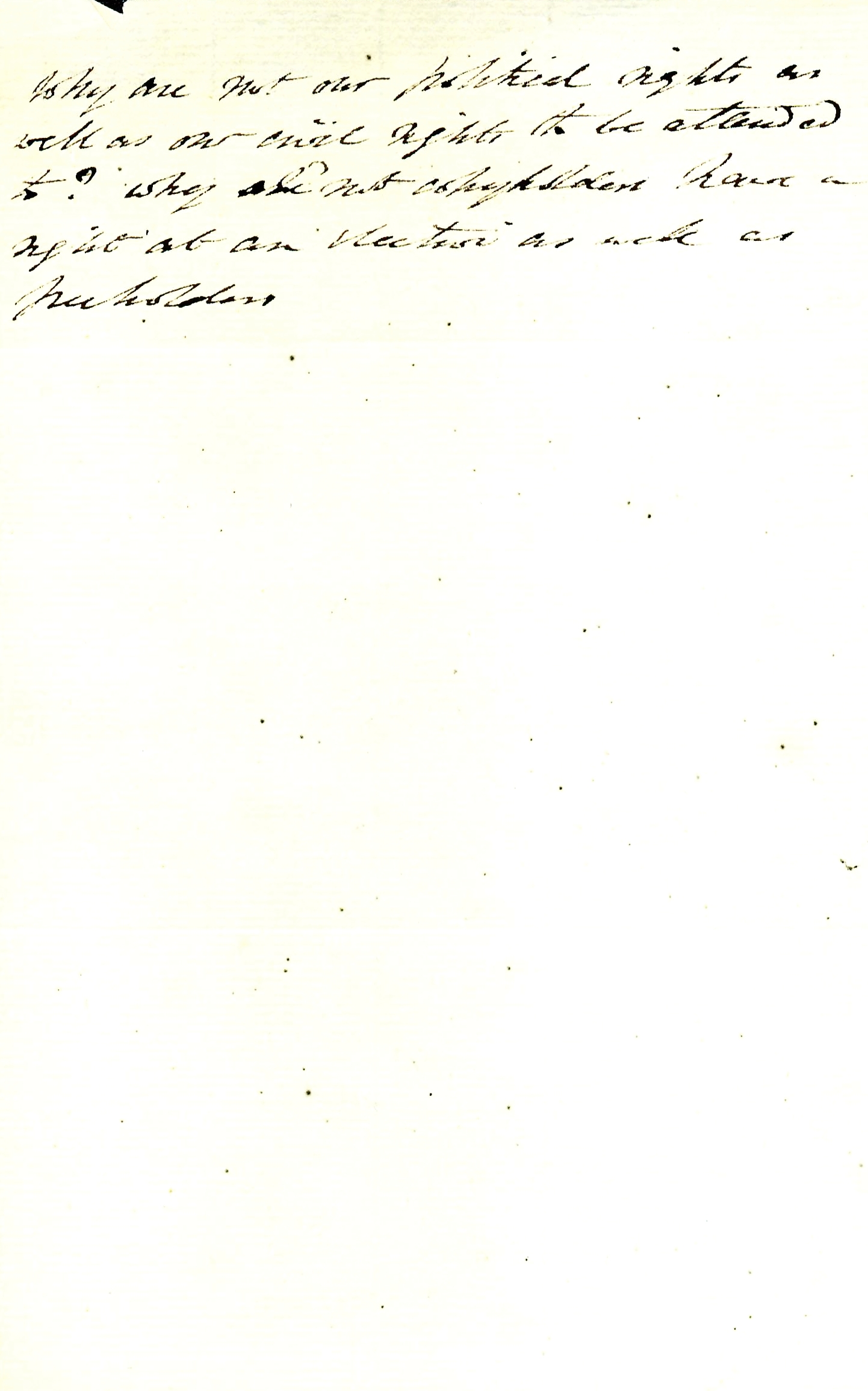Difference between revisions of "Commentaries on the Laws of England"
(New category.) |
(Intro by Connor Baer.) |
||
| Line 3: | Line 3: | ||
__NOTOC__ | __NOTOC__ | ||
[[File:BlackstoneCommentariesv3TitlePage.jpg|right|thumb|200px|Title page from [https://catalog.swem.wm.edu/law/Record/2076124 ''Commentaries on the Laws of England''], volume three, George Wythe Collection, Wolf Law Library, College of William and Mary]] | [[File:BlackstoneCommentariesv3TitlePage.jpg|right|thumb|200px|Title page from [https://catalog.swem.wm.edu/law/Record/2076124 ''Commentaries on the Laws of England''], volume three, George Wythe Collection, Wolf Law Library, College of William and Mary]] | ||
| − | < | + | |
| + | William Blackstone’s ''Commentaries on the Laws of England'' is widely considered “the most celebrated, widely circulated, and influential law book ever published in the English Language.”<ref>Wilfrid Prest, [http://www.oxforddnb.com/view/article/2536 “Blackstone, Sir William (1723-1780)”] in ''Oxford Dictionary of National Biography'' (Oxford University Press, 2004- ), accessed 3 October 2013. (Subscription required for access.)</ref> Blackstone was born in 1723, the son of a prosperous silk mercer in Cheapside, London.<ref>I. G. Doolittle, "Sir William Blackstone And His Commentaries on the Laws of England (1765–9): A Biographical Approach," ''Oxford Journal of Legal Studies'' 3, no. 1 (1983):100.</ref> He was originally educated at the Charterhouse School and matriculated at Pembroke College of Oxford in 1738.<ref>Prest, “Blackstone, Sir William.”</ref> Two years into his time at Oxford, Blackstone was admitted as a candidate to the Bachelor in Civil Law degree (BCL) and in 1741 was granted admission to the [http://en.wikipedia.org/wiki/Middle_Temple Middle Temple].<ref>Ibid.</ref> He was unsatisfied with practicing law, however, and preferred instead the academic life.<ref>Ibid.</ref> In his teaching, Blackstone sought to: | ||
| + | <blockquote>lay down a general and comprehensive Plan of the Laws of England; to deduce their History and Antiquities; to select and illustrate their Leading Rules, and Fundamental Principles; to explain their Reason and Utility; and to compare them frequently with the Laws of Nature and of other Nations; without dwelling too minutely on the Niceties of Practice, or the more refined Distinctions of particular Cases.<ref>Ibid.</ref></blockquote> | ||
| + | |||
| + | In 1758, Blackstone was awarded the title of the first Vinerian chair of English law, a salaried position created in accordance with the will of the late Charles Viner.<ref>Ibid.</ref> Seven years later, he published the first edition of his ''Commentaries on the Laws of England'', his premier work.<ref>Ibid.</ref> “In some 2000 pages the common law's tortuous complexities were outlined in a manner at once authoritative, clear, elegant, and even engaging.”<ref>Ibid.</ref> The ''Commentaries'' were immediately a success. In their first printing in the colonies, 1400 copies were ordered for Philadelphia alone.<ref>William Bader, "Some Thoughts on Blackstone, Precedent and Originalism," ''Vermont Law Review'' 19, no. 5 (1995): 7.</ref> The ''Commentaries'' are ranked second only to the Bible in the amount of influence they played on the American founders.<ref>Ibid: 8.</ref> In the wake of his successful publication, Blackstone was appointed a Justice of the Common Pleas and served out his days on the bench until his death in 1780.<ref>Julian Waterman, "Mansfield and Blackstone's Commentaries," ''The University of Chicago Law Review'' 1, no. 4 (1934): 554.</ref> | ||
==Bibliographic Information== | ==Bibliographic Information== | ||
| Line 12: | Line 16: | ||
'''Published:''' Oxford: Printed at the Clarendon Press, 1765-1769. | '''Published:''' Oxford: Printed at the Clarendon Press, 1765-1769. | ||
| − | '''Edition:''' | + | '''Edition:''' First edition; four volumes. |
==Evidence for Inclusion in Wythe's Library== | ==Evidence for Inclusion in Wythe's Library== | ||
| Line 18: | Line 22: | ||
==Description of the Wolf Law Library's copy== | ==Description of the Wolf Law Library's copy== | ||
| − | + | <br /> | |
| + | <br /> | ||
| + | View this book in [https://catalog.swem.wm.edu/law/Record/2076124 William & Mary's online catalog.] | ||
==External Links== | ==External Links== | ||
[http://books.google.com/books?id=eK4WAAAAQAAJ&printsec=frontcover&dq=Commentaries+on+the+Laws+of+England+1765&hl=en&sa=X&ei=fADfUbagENLG4AP0l4HoDg&ved=0CEcQ6AEwBA#v=onepage&q=Commentaries%20on%20the%20Laws%20of%20England%201765&f=false Google Books] | [http://books.google.com/books?id=eK4WAAAAQAAJ&printsec=frontcover&dq=Commentaries+on+the+Laws+of+England+1765&hl=en&sa=X&ei=fADfUbagENLG4AP0l4HoDg&ved=0CEcQ6AEwBA#v=onepage&q=Commentaries%20on%20the%20Laws%20of%20England%201765&f=false Google Books] | ||
Revision as of 13:07, 4 October 2013
by William Blackstone

William Blackstone’s Commentaries on the Laws of England is widely considered “the most celebrated, widely circulated, and influential law book ever published in the English Language.”[1] Blackstone was born in 1723, the son of a prosperous silk mercer in Cheapside, London.[2] He was originally educated at the Charterhouse School and matriculated at Pembroke College of Oxford in 1738.[3] Two years into his time at Oxford, Blackstone was admitted as a candidate to the Bachelor in Civil Law degree (BCL) and in 1741 was granted admission to the Middle Temple.[4] He was unsatisfied with practicing law, however, and preferred instead the academic life.[5] In his teaching, Blackstone sought to:
lay down a general and comprehensive Plan of the Laws of England; to deduce their History and Antiquities; to select and illustrate their Leading Rules, and Fundamental Principles; to explain their Reason and Utility; and to compare them frequently with the Laws of Nature and of other Nations; without dwelling too minutely on the Niceties of Practice, or the more refined Distinctions of particular Cases.[6]
In 1758, Blackstone was awarded the title of the first Vinerian chair of English law, a salaried position created in accordance with the will of the late Charles Viner.[7] Seven years later, he published the first edition of his Commentaries on the Laws of England, his premier work.[8] “In some 2000 pages the common law's tortuous complexities were outlined in a manner at once authoritative, clear, elegant, and even engaging.”[9] The Commentaries were immediately a success. In their first printing in the colonies, 1400 copies were ordered for Philadelphia alone.[10] The Commentaries are ranked second only to the Bible in the amount of influence they played on the American founders.[11] In the wake of his successful publication, Blackstone was appointed a Justice of the Common Pleas and served out his days on the bench until his death in 1780.[12]
Bibliographic Information
Author: William Blackstone (1723-1780)
Title: Commentaries on the Laws of England.
Published: Oxford: Printed at the Clarendon Press, 1765-1769.
Edition: First edition; four volumes.
Evidence for Inclusion in Wythe's Library
Description of the Wolf Law Library's copy
View this book in William & Mary's online catalog.
External Links
References
- ↑ Wilfrid Prest, “Blackstone, Sir William (1723-1780)” in Oxford Dictionary of National Biography (Oxford University Press, 2004- ), accessed 3 October 2013. (Subscription required for access.)
- ↑ I. G. Doolittle, "Sir William Blackstone And His Commentaries on the Laws of England (1765–9): A Biographical Approach," Oxford Journal of Legal Studies 3, no. 1 (1983):100.
- ↑ Prest, “Blackstone, Sir William.”
- ↑ Ibid.
- ↑ Ibid.
- ↑ Ibid.
- ↑ Ibid.
- ↑ Ibid.
- ↑ Ibid.
- ↑ William Bader, "Some Thoughts on Blackstone, Precedent and Originalism," Vermont Law Review 19, no. 5 (1995): 7.
- ↑ Ibid: 8.
- ↑ Julian Waterman, "Mansfield and Blackstone's Commentaries," The University of Chicago Law Review 1, no. 4 (1934): 554.
